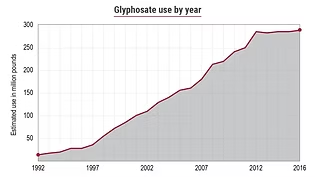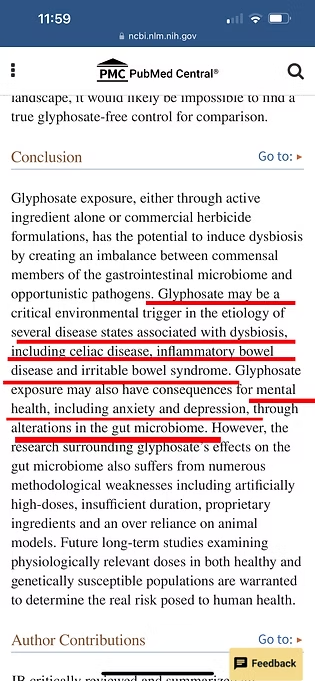Here are some great resources on Glyphosate
The Unseen Threat in Your Food
Is the food you’re consuming slowly harming your health? The alarming truth is that it might be. The culprit is a chemical called glyphosate, which has been increasingly used in agriculture since its introduction in 1992. This article will explore the dangers of glyphosate in your food and provide insights into how you can protect yourself and your loved ones.
The Glyphosate Surge: A Growing Concern
Glyphosate was initially introduced as an effective herbicide and quickly gained popularity due to its ability to control weeds. The graph of its usage over the past two decades shows an alarming increase, as it became a staple in modern agriculture. Today, glyphosate is found in many of the products we consume daily, from cereals like Cheerios and Lucky Charms to staples like oats.
How Glyphosate Affects Living Organisms
The primary function of glyphosate as an herbicide is to kill unwanted plants and insects. It accomplishes this by puncturing the stomachs of insects, causing them to die. This raises the question of how glyphosate might affect humans who consume food products containing the chemical.
Research on glyphosate has revealed a range of potential health risks. According to scientific studies, this chemical can contribute to various diseases and conditions, including:
1. Dysbiosis:
An imbalance in the gut microbiome, leading to digestive issues and weakened immunity.
2. Celiac Disease:
An autoimmune disorder triggered by gluten, causing damage to the small intestine.
3. Inflammatory Bowel Disease (IBD):
A chronic inflammation of the digestive tract, including Crohn’s disease and ulcerative colitis.
4. Irritable Bowel Syndrome (IBS):
A common disorder affecting the large intestine, causing symptoms like cramping, bloating, and diarrhea.
Mental health issues stemming from the potential neurological effects of glyphosate.
These health risks demonstrate the importance of being aware of the potential dangers associated with consuming food products containing glyphosate.
Choosing Organic: A Healthier Alternative
To minimize your exposure to glyphosate and its associated health risks, consider switching to a 100% organic diet. Organic foods are produced without the use of harmful chemicals, providing a safer and healthier option for you and your family. By making this change, you can work towards eliminating the potential causes of chronic health issues linked to glyphosate.
Conclusion: Take Control of Your Health Today
The presence of glyphosate in our food supply is a growing concern. By understanding the risks associated with this chemical and making informed choices about the products we consume, we can take control of our health and protect ourselves from its harmful effects. Share this information with your loved ones and consider making the switch to an organic diet for a healthier future.
If you found this article informative and valuable, please like, comment, and share it with those you care about. Together, we can make a difference in our health and well-being.
Frequently Asked Questions (FAQ)
Glyphosate is a widely used herbicide that has seen an alarming increase in agricultural use since 1992. It's concerning because it's found in many common food products like cereals (Cheerios, Lucky Charms) and oats. As a chemical designed to kill plants and insects by puncturing their stomachs, its presence in our food raises serious questions about potential health effects on humans who consume it regularly.
Scientific research links glyphosate exposure to several serious health conditions, including gut dysbiosis (microbiome imbalance), celiac disease, Inflammatory Bowel Disease (IBD), Irritable Bowel Syndrome (IBS), and mental health issues like anxiety and depression. These risks highlight the importance of being aware of glyphosate in our food supply.
Glyphosate works by puncturing the stomachs of insects, which raises concerns about how it might affect human digestive systems. Research suggests it can disrupt gut health, potentially leading to various digestive disorders and autoimmune conditions, as well as impacting neurological health.
Glyphosate is commonly found in many conventional (non-organic) food products, particularly cereals like Cheerios and Lucky Charms, as well as oats and other grains that are sprayed with the herbicide before harvest.
The most effective way to minimize glyphosate exposure is to switch to a 100% organic diet. Organic foods are produced without synthetic herbicides like glyphosate, providing a safer alternative that can help eliminate potential causes of chronic health issues linked to this chemical.









